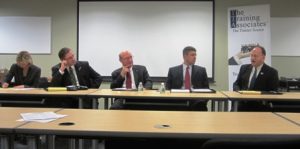
By Bonnie Adams, Government Editor
Westborough – It's not easy to operate a business anywhere nowadays and that is certainly true in Massachusetts. But if several Republican lawmakers have their way, there will be regulatory changes made that will make it easier for companies to function and thrive in the commonwealth.
On Nov. 7, state representatives Matthew Beaton, R-Shrewsbury, and George N. Peterson Jr., R- Grafton, hosted the “2011 GOP Jobs Tour” at the Training Associates in Westborough. Joining them were state representatives Kimberly Ferguson, R-Holden; Kevin Kuros, R-Uxbridge; and Steven Levy, R-Marlborough.
The event was one in a series the lawmakers have been holding as a way for constituents to share their views on the business climate in Massachusetts. Peterson said the representatives hope to assemble a group of bills by January 2012 and then hold public hearings on Beacon Hill to discuss potential changes.
James Harvey, the CEO of E.L. Harvey & Sons, Inc., a Westborough-based trash and recycling company, told the panel that the Department of Environmental Protection has tried to pass laws that would restrict the hours that companies such as his could go on pick-up runs. But because of Harveys” volume of business, it needs to be able to continue to work around the clock, he said.
“You make the rubbish. We'se got to pick it up and get rid of it,” he said.
The lawmakers also heard from other attendees on a range of subjects including regulations regarding independent contractors, the rising cost of health care, and the Cape Wind project and its far-reaching effects on the cost of electricity.
Beaton noted how EMC had recently decided to not open a large computer center in a building in Westborough, in spite of millions of dollars of renovations that had already been completed. Instead, he said, they chose to relocate to North Carolina, where the cost of energy was much cheaper.
Kuros said certain industries such as so-called “green technology” still had a ways to go before becoming viable. For now, those industries were being supported by taxpayer subsidiaries, such as the case of National Grid extending their costs for the Cape Wind project to customers in central Massachusetts.
National Grid's performance during and after Tropical Storm Irene and the Oct. 29 Nor'saster was also the target of the representatives” and attendees” wrath.
Jim Brown, an executive from Primary Colors Inc. in North Grafton, noted that it was “devastating” when his company was shut down for three days during the Oct. 29 storm.
“The communication from National Grid was horrible,” he added. “Their reps had no idea of what was going on.”
Levy noted that Hudson did “significantly better” than many other communities because that town has a municipal electric utility company. But it was very hard, he cautioned, for a town to set up a separate entity such as Hudson had, due to legislation that allowed companies such as National Grid to veto any such plans.
Peterson noted that each year over 6,000 bills are filed with the state Legislature, yet only 300 to 350 of those actually get passed.
“Nothing moves on the hill unless it gets lots of noise,” he said. “I urge you to call, write or send emails to your reps.”
Constituents can go to www.malegislature.gov to get email addresses for their local representatives, he added.

















